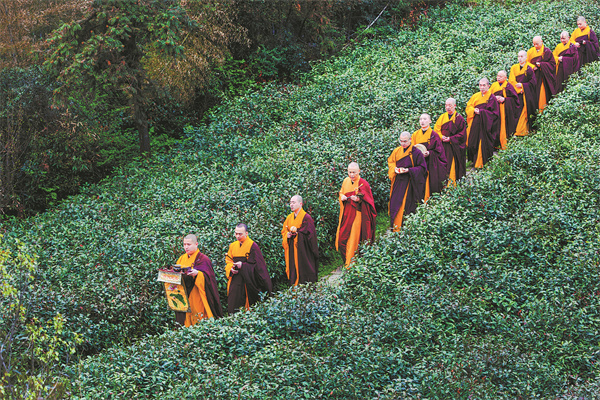It is also a platform for promoting and exchanging tea culture.
Before setting out on his journey to research tea, Lu had led an unusual life. Abandoned as an infant in what is today's Tianmen, Hubei province, he was adopted in the year 733 by Zhiji, a Buddhist abbot, and grew up in the Longgai Temple.
It was there that he first learned to brew tea, but unwilling to live a pious life, in his teens he became an actor of comedic characters. Later an official recognized his talent and recommended him to pursue further learning.
When the An Lushan Rebellion broke out in 755, Lu left Central China for the east and started his exploration into tea.
Perhaps his bond with the Zen lifestyle never ended. At Huzhou's Miaoxi Temple, he met Jiaoran, a monk poet who enlightened him in the philosophy of tea drinking.
"Served as a beverage, tea is best suited to those who uphold discipline and moral conduct," Lu wrote in The Classic of Tea, emphasizing the tea preparation and ritual, which helped elevate tea into a symbol of refinement and social status.
An exemplar among tea drinking rituals is the Jingshan Tea Ceremony, a solemn ceremony hosted at the Jingshan Temple in Yuhang district, Hangzhou, Zhejiang province, where Lu visited during his journey.
Though it is recorded that the temple's founder offered tea as a sacrifice to Buddha in the mid-Tang Dynasty, the ceremony became a mature practice during the Song Dynasty (960-1279), in which tea was relished by Buddhist monks and guests, the majority of whom were literati and bureaucrats.
Here, tea became a medium for meditation and enlightenment, which involved more than 10 formal procedures, including welcoming the guests, burning incense and paying tribute, as well as making and drinking the tea.
"The ceremony reflected the refined lifestyle of literati and bureaucrats from the Song Dynasty," says Yanping, a Buddhist monk at the temple and an inheritor of the art form.
"The senior monks of Jingshan Temple at the time wanted people to feel their own existence through relishing a cup of tea."
Contrary to contemporary tea drinking, habits of consuming a considerable amount within a short time, Yanping says that Song Dynasty attendees would usually savor one small cup in two hours in silence.

